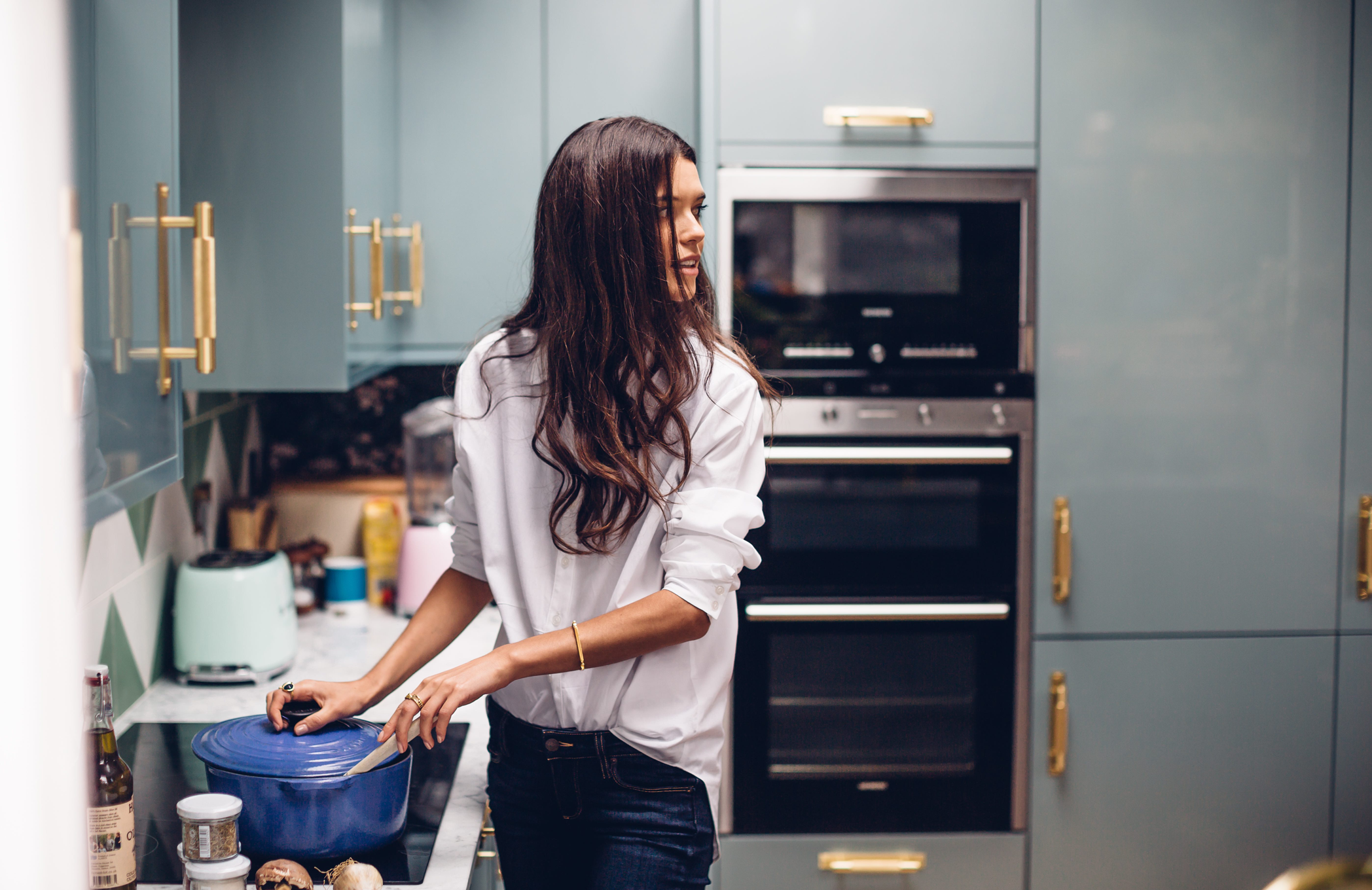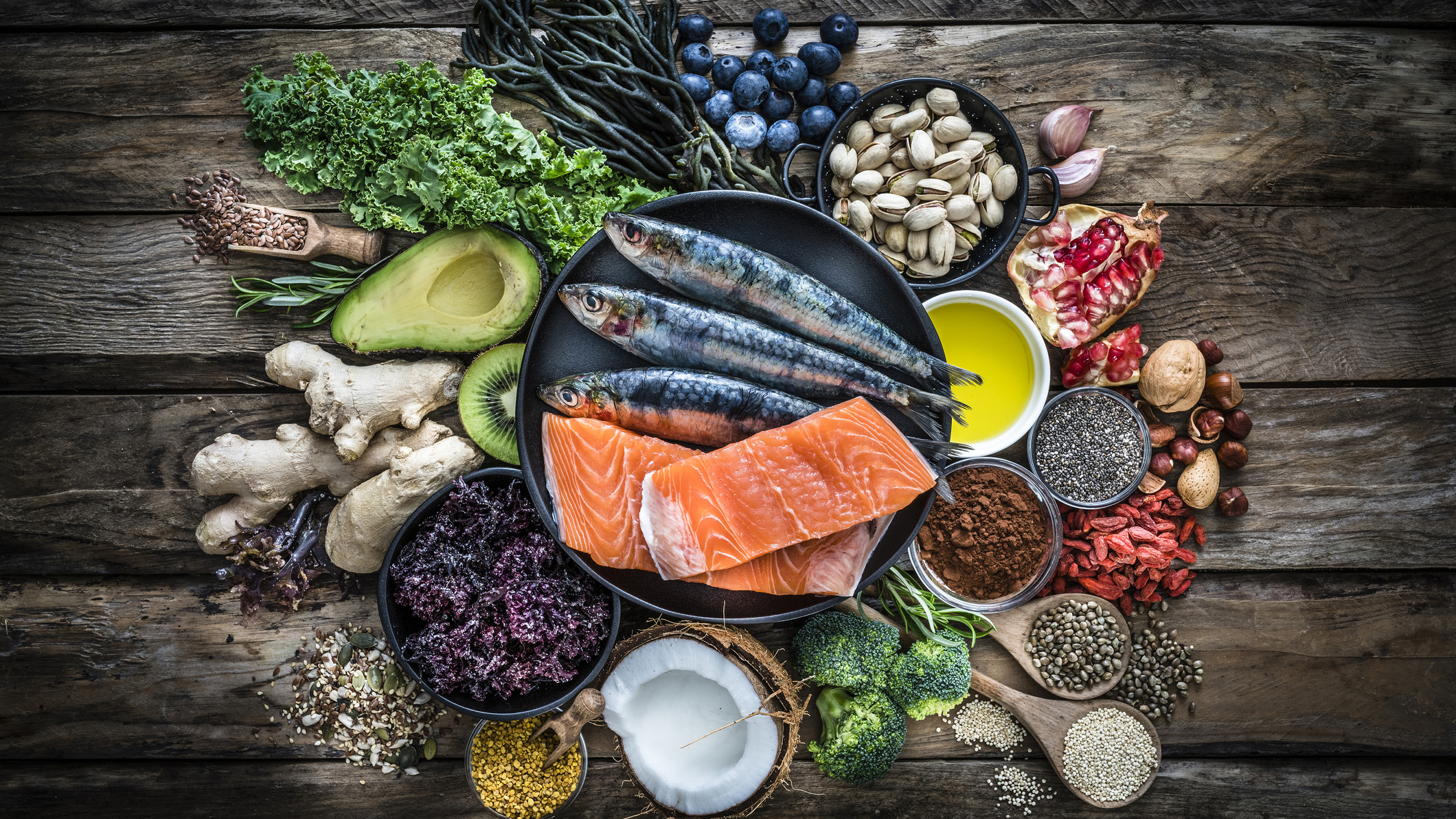Sarah Ann Macklin’s science-backed healthy eating tips
The nutritionist and model wants us all to switch up our diet plans, and it all starts with five a day


Sarah Ann Macklin first became interested in nutrition after working with other models in New York, and witnessing first-hand how our complex relationship with food could positively (and negatively) affect our mental health.
On returning from the States, she qualified as a registered nutritionist and has recently launched “The Great British Veg Out” (or GBVO), a month-long challenge to get us all eating healthier. She shares her nutrition tips with Fit&Well.
Healthy eating tip #1: Get your five a day
It's advice as old as the hills, but there's still plenty of relevance to the age-old rule.
“There’s a lot of reasons why it’s important to get our five a day,” said Macklin. The GBVO challenges its participants to get their five a day, every day, for 30 days, and Macklin wants to ring attention to just how far off the mark we really are.
“It's a minimum of 400g of fruit and veg a day. That is linked to lowering heart disease, cancer, hypertension and type-2 diabetes. Sadly, only 28% of the UK population eat their five a day right now, so trying to maintain and expand on that is crucial.”
Macklin’s challenge comes at a time when the UK’s Prime Minister, Boris Johnson, is launching an anti-obesity drive to help beat COVID-19, including an NHS Weight Loss Plan app. The drive is encouraging people to exercise more, track their calories and cut down on our favourite processed foods.
“If we can increase our consumption of fibrous, plant-based foods,” says Macklin, “we naturally decrease our consumption of those processed foods without thinking about it. We are bombarded every day by cheap processed foods, and it’s hard to make the right decision in the supermarket."
- Best Fitbit deals - snap one up today!
- Fitness and nutrition planner deals at Amazon
Healthy eating tip #2: Cook easier and cheaper
Eating healthy often comes with a price tag, with the processed food that isn’t very good for you often working out cheaper than the more nutritional option. How do we make eating healthily on a budget easy?
Start your week with achievable workout ideas, health tips and wellbeing advice in your inbox.
“Health inequality is one of the biggest problems we face, with rich areas enjoying nineteen years of good health than the more deprived areas in the UK. That comes down to cost, economics of where they’re living, green areas available to exercise… to change it, you need to get a well-rounded picture.”
There’s easy ways to cut down on the cost of ingredients. One study by the University of California showed no significant difference in the nutritional value of frozen fruit and veg vs the fresh stuff. Buying bags of frozen peas, carrots and broccoli florets is just as good for you, works out cheaper and keeps for longer.
Grab some big bags of frozen vegetables and try a few short, 15-minute cooking-time recipes using ten or fewer ingredients to get a quick, healthy dinner on the table. Macklin ’s website is offering 30 free veg-packed recipes – one for each day of the challenge – absolutely free.

Healthy eating tip #3: Eat to improve your mental health
“People are now much more aware of eating for their mental well-being as well as their physical wellbeing,” says Macklin. “For example, we can look at gut health, where serotonin is made, and that is your “happy” hormone and it makes you feel good. Poor diversity in gut bacteria correlates to more depression and anxiety.”
Macklin’s long studied the effect of nutrition on mental health. To stave off harmful symptoms of anxiety and depression, ensure you’re taking in a diverse cast of micronutrients, eating lots of different fruits, veg, grains, pulses, nuts and some (unless you’re a vegetarian) animal products. A colourful plate improves your microbiome and the diversity of the bacteria in your gut, encouraging serotonin production.
“There has been some interesting research which has shown associations between increased oily fish consumption and reduced symptoms of depression. Essential fatty acids found in marine sources need to be included within your diet and are crucial for brain functioning.
"If you’re vegan, you won’t be having any of those long-chain omega-3s you can only get from oily fish, so do try and get an algae supplement to support that.”
- Get your oily fish quota with the Mediterranean diet
Healthy eating tip #4: Use what you have
If you go to make a recipe only to find out you don’t have the necessary ingredients, you might find yourself reaching for the phone to order a pizza. However, don’t get tempted: researchers from the University of Washington found those who cook at home rather than order out were healthier, and incurred fewer additional expenses, than those who ordered takeaways on a regular basis.
Instead, get creative.“Whenever I’m cooking a recipe, I usually end up swapping an ingredient with something else because I don’t happen to have it on hand,” says Macklin. “In our recipes, we say ‘don’t worry if you’ve not got all the ingredients. Instead of a chickpea, use any legume, it’ll be fine, it’ll still count towards that five a day.’
“You’ll realise you don’t have everything for a recipe and start naturally adapting it. And when you realise that’s not a mistake, but you’ve actually improved that dish, then you’ll become less afraid to steer away from recipes. Keep simple recipes, but adapt them.”

Healthy eating tip #5: Tune out the bad advice
Here at Fit&Well, we speak to the experts, look at the science and try and present it all in an accessible format. However, Instagram, Twitter and other social media channels are something of a wild west, full of unsolicited advice and beach body snaps. How do you sort the good advice from the bad?
“First of all, if there is any health professional saying ‘this is the perfect diet’, don’t trust them! That is the number one question I’m asked as a nutritionist: what is the perfect diet. And my answer is always ‘whatever is right for you’. If somebody on Instagram is trying to tell you there’s a perfect diet out there, they don’t know you and they don’t know your body.
"You haven’t had a consultation with them or told them your full background. Always look to check if they’re a registered nutritionist or dietician too."
Recognising who you're taking your advice from is key: although celebrities in magazines and people on social media might look fit, it's not simply a case of "results that speak for themselves". Your body is unique, and it's better to move towards general healthy eating principles than to try some strict, calorie-restricted diet you found on the net.
"If anyone makes you feel bad about what you’re eating, or shaming certain foods, or labelling certain foods as “bad” or “wrong”, I would also take that as a big red flag,” said Macklin. First and foremost, eating healthy should be enjoyable, not ridden with guilt.
Healthy eating tip #6: Make eating more social
One study published in the scientific journal Nutrients found slowing your eating rate appears to be an effective strategy for reducing food intake and helping digestion. Eating faster means less of our food is processed as energy and more of it is stored as fat, while eating slower does the exact opposite.
“My final nutritional rule is to try and take time to eat with friends and family,” says Macklin. “There’s so much more to what you eat, including who you eat it with, which is really important. Social engagement makes you eat slower, which helps with your digestion. Otherwise, just relax and enjoy it. It’s one of the most social things to do.”
If you’ve got all those new recipes, why just try them on your own? Get people round the table, whether it’s the family in your house or a group of your (socially distant) friends, showing everyone eating healthy doesn’t have to be a boring slog.
You've also got the added benefit of enjoying the company of others, eating slower than you would otherwise and improving your digestion in the process.
Liked this?
Matt Evans is an experienced health and fitness journalist and is currently Fitness and Wellbeing Editor at TechRadar, covering all things exercise and nutrition on Fit&Well's tech-focused sister site. Matt originally discovered exercise through martial arts: he holds a black belt in Karate and remains a keen runner, gym-goer, and infrequent yogi. His top fitness tip? Stretch.
